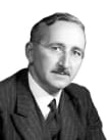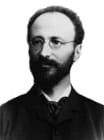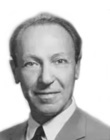Murray N. Rothbard (1926-1995)

A robber who justified his theft by saying that he really helped his victims, by his spending giving a boost to retail trade, would find few converts; but when this theory is clothed in Keynesian equations and impressive references to the ‘multiplier effect,’ it unfortunately carries more conviction.
The lack of a prestigious academic base did not prevent Murray N. Rothbard from reaching a wide audience of scholars, students, and the general public. Rothbard was an amazingly prolific author with over 20 books to his credit, including classics like Man, Economy, and State (1962), America’s Great Depression (1963), Power and Market (1970), For a New Liberty (1973), Conceived in Liberty (1976), The Ethics of Liberty (1982) or The Mystery of Banking (1983). Most of his books are still in print. He also published several hundred scholarly essays on a range of topics from ethics, philosophy, and the history of ideas to history and economics, let alone countless book reviews or political articles, etc.. His enormous literary output comprising a vast variety of subjects is unified by one fundamental topic: His passionate, yet judicious dedication to the study of individual freedom, including the intrinsic problem of Self-Ownership. He died in New York of cardiac arrest on January 7, 1995.
I
Murray Newton Rothbard was born in the Bronx (New York) into a family of eastern European immigrants and grew up in the deeply leftist milieu and almost communist culture of the Jewish middle-class of New York. Because he was bullied in public schools his parents put him in a private institution where he thrived academically. While most of his fellow school mates were rather naive socialists, young Rothbard already tended to free market positions and early on was drawn to Ayn Rand’s and Albert J. Nock’s anti-militaristic and state-skeptical stands.
Rothbard attended Columbia University in New York and received his Bachelor of Arts degree in mathematics. In 1946, however he switched to economics, made his Master degree and, a scandalous 10 years later was awarded his PhD in economics. The unfair and unprecedented delay in receiving his PhD was not only caused by a political controversy with his dissertation advisor, but partly also by Arthur Burns who rejected his dissertation (published in 1962 as The Panic of 1819), mostly due to the fact that Rothbard firmly opposed the dogma of economic interventionism in mainstream economics. Rothbard could only proceed his academic career when Burns left Columbia
University to head Eisenhower’s ‘Council of Economic Advisors’. He later became chairman of the Federal Reserve (FED) under US President Richard Nixon.
George Stigler (Nobel Prize 1982), one of his teachers at Columbia in 1946 introduced Rothbard to the newly established think tank The Foundation of Economic Education (FEE) where he not only became aware of a totally different train of economic reasoning. At FEE he met among others Milton Friedman (Nobel Prize 1976) and a number of libertarian journalists such as Henry Hazlitt, Leonard Read (founder of FEE), Albert Jay Nock, Rose Wilder Lane or Frank Chodorow. But most importantly, there he was attracted to the teaching of Ludwig von Mises, who soon became his mentor.
When L.v. Mises at last was permitted to conduct his weekly seminar at New York University in 1949, Rothbard immediately signed up and tried hard not missing one session. This seminar and the so-called Circle Bastiat, where Rothbard, Leonard Liggio, Ralph Raico, George Reisman, Robert Hessen or Ronald Hamowy among others regularly met, provided an important focal point for making the Austrian School of Economics known in the US. These meetings coincided with the publication of Mises’ Human Action. A Treatise on Economics (1949), the English translation of his magnum opus Nationalökonomie. Theorie des Handelns und Wirtschaftens (Geneva 1940, 1984, 2013). Due to WWII raging in Europe and the Nazi terror, regretfully the original could not reach the German speaking world.
II
Over the years, Rothbard’s uncompromising position of rejecting any socio-economic state interventions and his radical anti-state views branded him an academic outsider. His unyielding stand made it impossible for him to find even a minor teaching job. However, following Mises’ recommendation, the private William Volker Fund employed Rothbard first as a Book Reviewer and several years later as a Senior Analyst with the task of writing a textbook that could be used to introduce college undergraduates to the Austrian School of Economics. For well over 10 years the Volker Fund’s patronage allowed Rothbard to work mostly from home as a freelancer. Among the countless important essays on economic history, on economics and methodological problems, only his 1956 essay ‘Toward a Reconstruction of Utility and Welfare’ should be mentioned here. Building on the theoretical framework of the Austrian School he showed that utility is something that we can know only by observing individual preferences revealed through human action. Utility, for him is a strictly ordinal and subjective concept that cannot be aggregated.
However his main task at the Volker Fund resulted in his seminal book Man, Economy, and State. A Treatise on Economic Principles (1962). This is a comprehensive critique of government coercion that was praised by L. v. Mises as “an epochal contribution to the general science of human action, praxeology and economics.”
Just a year later he published yet another classic: America’s Great Depression (1963), where he not only blamed the U.S. government policy failures for causing the destructive Great Depression, which lasted roughly from 1929 to 1939. Here he also rejected the still prevailing view that free markets were unstable and thus needed the state to intervene. Applying Carl Menger’s theory of the development of monetary institutions, E. v. Boehm-Bawerk’s theories of capital and time-preference of interest, and Mises’ methodology and his trade cycle theory, he made it clear in these two works, that neither recessions nor depressions are an inevitable part of free market systems.. More to the point, he argued that these crises were mainly caused by central bank inflationary policies, the corresponding distortion of interest rates and malinvestment of capital and price increases that go with it.
Due to an unwarranted power struggle within the management of the Volker Fund, F.A. Harper’s and Murray Rothbard’s work contracts were suddenly terminated and the Fund eventually moved to Burlingame (CA) and was dissolved in the late 1970s. This left him without a job for a while. However, it seems as if Rothbard’s uncompromising criticism of interventionist US foreign policy and the Vietnam War made him unexpectedly acceptable for some left-wing academics. It was mainly for these reasons that he finally was offered a modest part-time job teaching economics to engineering students at Brooklyn Polytechnic Institute starting in 1966. Although this institution had neither an economics department nor an economics majors program and was mainly staffed with hard-core Keynesians and even Marxists, he liked teaching at Brooklyn Polytechnic. Working only two days a week gave Rothbard the time to contribute to many path-breaking developments in libertarian ideas and politics. Rothbard continued to teach there until 1986 when, thanks to a generous endowment made by the successful lumber entrepreneur and free-market philanthropist Sherwood James Hall, he was finally offered a regular and decently paid professorship at the University of Nevada, Las Vegas. He held the title of S.J. Hall Distinguished Professor of Economics until his much too early death in 1995.
III
Murray N. Rothbard was an amazingly prolific author with over 20 books, several hundred scholarly essays on economics, methodology or the history of economic thought, let alone countless book reviews or political articles, etc. to his credit. His enormous literary output comprising a vast variety of subjects is unified by one fundamental topic: His passionate, yet judicious dedication to the study of individual freedom, including the philosophically difficult problem of Self-Ownership. For Rothbard, personal freedom is rooted in human nature. Due to the fact that people are equipped with the ability to think, they also are accountable and liable for their actions and behavior. Thus he interprets personal responsibility as self-ownership, in other words people belong to themselves and everything that they create must also belong to them, i.e. they have legal control over the product of their work. This argument is no different from other classic defenses of free markets.
However, Rothbard’s conclusions is different: People who act independently create all the necessary social institutions through agreements and contracts on a voluntary basis, be it courts, police, schools or other cultural institutions. In his major work on political philosophy, The Ethics of Liberty (1982) he clarifies the Principle of Self-Ownership, as an a priori axiom. I.e. if one denies that each human being owns her of his own body, one must logically hold that some people own others, which logically accounts for slavery. Based on this argument, however he claims that states or governments engaging in compulsory measures stand in sharp (and illogic) contrast to their firm rejection of slavery. A military draft, the mandatory taxation or most other government enforced public duties serve as examples. Rothbard’s The Ethics of Liberty is a significant contribution to political philosophy, and yet, at times it leaves the reader plenty of room to disagree.
In his book Power and Market (1970/1977), he expanded L.v. Mises’ comprehensive critique of government coercion by developing three distinctly different and, politically not always very practical categories of state intervention: autistic, binary and triangular. Accordingly, an autistic intervention prevents a person from exercising control over his own person or property, as with homicide or infringements on free speech. A binary intervention for him is a coerced exchange between an invader and her/his victim. He used cases of a highway robbery or the mandated income tax as examples. In the triangular intervention, an invader forces two people to make an exchange or prohibits them from doing so. Here he referred to political instruments such as rent control or the fiercely debated minimum wages.
IV
Already from the late 1950s on, but especially during the Vietnam War, which he vigorously opposed, Rothbard endeavored to apply his theoretical work to current politics and developed the political idea of libertarianism. He used this term that first appeared in the literature in the early 1950s, in order to merge the concept of ‘self-ownership’ and the rejection of state tolerated coercion or violence in the forms of drafts or wars on moral grounds with his consistent refutation of any use of state intervention on economic grounds. Although libertarianism by its nature has diverse directions and wings, and like most political theories cannot be viewed as a strictly unified movement, Rothbard played a decisive role in the foundation of the ‘Libertarian Party’. Following intense discussions between Rothbard, John Hospers (USC), Ed Crane, Manuel Klausner among others and financed by David Koch (Koch Industries), the Libertarian Party was founded in 1971 in Westminster (CO). Ed Crane is credited with building the party from scratch. Rothbard’s book For A New Liberty (1973) more or less reflects the political platform of the newly established party and is a popular account of libertarian ideas.
In an effort to widen the influence of libertarian thought in the academic world, Rothbard founded the Journal of Libertarian Studies in 1977 and inaugurated its publication auspiciously with a symposium on Robert Nozick’s path-breaking book, Anarchy, State, and Utopia (1974). The Journal of Libertarian Studies has remained the most important journal welcoming to libertarian ideas, both popular and academic. About 10 years later in 1987 Rothbard founded yet another successful journal, the Review of Austrian Economics. Although it appears since 1997 under the new name Quarterly Journal of Austrian Economics, to date it is still the key academic journal for scholars of all disciplines interested in the Austrian School of Economics.
Murray N. Rothbard, was a wonderfully humorous, pleasant and knowledgeable companion and colleague. His academic and journalistic achievements were prodigious with well over 20 books and hundreds of essays and articles, both academic and popular to his credit. He was the primary intellectual influence in founding the U.S. Libertarian Party, whose ‘godfather’ he continued to be until he broke with it a few years before his death. A sample of his political columns is available under the title The Irrepressible Rothbard (2000). Rothbard died in New York of cardiac arrest on January 7, 1995. Most of his works are still in print and readily available.
Kurt R. Leube





































